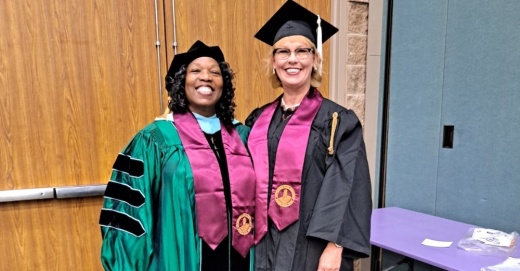Crosley then discovered the Adult Completion Program after speaking with an adviser at Midwestern State University. Within 18 months of enrolling, she had her degree and a job as administrative assistant in the school’s Office of the Registrar.
“[The program] has changed my life in so many ways,” Crosley said. “I have such a grateful heart. [It has given me] self-confidence, self-sufficiency and a broader perspective of different cultures.”
MSU and North Central Texas College, both of which have campuses in Flower Mound, offer several options for students in various phases of their adult lives. By “meeting students where they are,” the programs allow them to earn degrees on their own terms.
“Students may be able to cut off 18 months to two years of a traditional degree route, which saves them money, saves them time and saves a lot of brain cells,” said Delores Jackson, director of the Bachelor of Applied Arts and Sciences Adult Completion Program at MSU.
Across Texas, colleges and universities are zeroing in on adult education. The goal, according to the Texas Higher Education Coordinating Board, is to upskill and reskill members of the workforce so the state can remain competitive on the global stage.
Program logistics
According to Jackson, many of the students in MSU’s Adult Completion Program attended college but may not have finished. Others may have gone straight from high school into a technical field or military service. Years later, they realize that in order to advance their careers, they needed a degree.
“The students we have are ... great students, serious students,” Jackson said, noting that the average age of a student pursuing a Bachelor’s of Applied Arts and Sciences degree in the Adult Completion program is 35-45 years old. “They’re on a mission; they’re focused on finishing these degrees.”
Students eligible for MSU’s Adult Completion Program have at least 18-24 hours of nontraditional education, such as vocational training, workforce credit, military service or other applicable work experience. MSU can accept up to 90 credit hours that are applicable toward the 120-hour program, Jackson said.
Offerings for adult learners are usually compressed and accelerated and online or hybrid. Students enroll in courses based on what fits into their schedules, Jackson said.
Crosley said she was working more than 60 hours a week when she enrolled. The program gave her the flexibility to continue earning money while working toward her degree.
“I was able to develop a schedule that met my needs because I worked weird hours,” she said. “I still had to be devoted to my studies, but I was able to manage it better by being able to take some of the classes online.”
North Central Texas College also offers flexible opportunities for students to earn a degree, take professional development courses online or participate in workforce training.
“Many of our students are coming back to either finish a degree they started or retool their career options,” Chancellor Brent Wallace said. “It’s pretty awesome what we are able to do for an adult learner.”
Understanding the need
About 23% of Lewisville residents age 25 or older have attended some college but do not have a degree, according to 2019 American Community Survey five-year estimates. In Flower Mound and Highland Village, those percentages are about 17% and 21%, respectively.
In 2015, Texas Higher Education Coordinating Board set a goal of at least 60% of Texans ages 25-34 having a technical certificate or postsecondary degree by 2030. This initiative, dubbed 60x30TX, also aims to award 6.4 million certificates or degrees.
Without this benchmark, Texans face a future of “diminished incomes, opportunities and resources,” according to the board.
The 60x30TX goal is one of the primary drivers for MSU’s adult education initiatives, said Rachel Bagley, senior associate director of the Flower Mound campus.
The university’s latest effort to support adult learners is through a partnership with Guild Education, a nonprofit that matches colleges and universities with companies that want to offer a debt-free path for their employees to advance academically.
“Our initiatives align very well,” Bagley said of MSU’s partnership with Guild. “They are focused on adult workers who are seeking upward mobility, and we are focused on the exact same thing.”
Students enrolled in MSU’s Guild program do not pay any tuition up front, Bagley said. They also receive personalized coaching and technology services provided through Guild. Students enrolled in a Guild program are two times more likely to have a promotion or role change than the average employee, according to the organization.
Addressing hiring needs
At a recent roundtable hosted by MSU, Bagley said some of the largest employers in Denton County discussed needs from the workforce. The goal, Bagley said, was to see how MSU could train students to fill those gaps.
One of the biggest challenges employers say they encounter when hiring is a lack of soft skills, such as interviewing, public speaking and problem solving, and overall emotional intelligence, Bagley said.
In response, MSU is looking into developing workshops and seminars focused on improving these areas, Bagley said.
NCTC recently launched Aspire to Be Hired, a program that seeks to embed the development of marketable skills into the college’s existing programs. This integration is also part of the state’s 60x30TX initiative.
Crosley said the Adult Completion Program taught her more than just academics. She gained a newfound respect for diversity and other cultures, which she said are essential for her job. This constant pursuit of knowledge is the example she hopes to set for her family.
“I want my children and my grandchildren to see that once you get to a certain age, that doesn’t mean you stop learning,” she said. “You’re constantly learning.”






